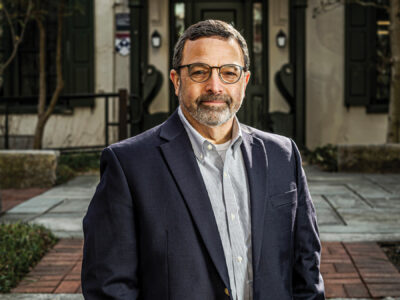
Back
in December, Dr. Gary Hack,
dean of the Graduate School of Fine Arts and the Paley Professor of Architecture
and Planning, was named chair of the Philadelphia City Planning Commission.
Having served on the transition team for Philadelphia Mayor John Street,
Hack is no stranger to the new administration, and there was ample precedent
for the appointment. Former GSFA dean G. Holmes Perkins Hon’72 chaired
the commission from 1958 through 1968, while one of his successors at
the school, Lee Copeland GFA’63 GAr’63 GCP’63, served as chair, vice chair
and commissioner.
Throughout
his career, the calm, quiet-spoken Hack has been deeply involved in planning
and urban-design issues. Before coming to Penn in 1996, he was professor
of urban design at MIT, and his books include Lessons from Local Experience
and Site Planning. Among his plans for urban waterfronts is the
West Side Waterfront project in New York, and his large-scale projects
include redeveloping the Prudential Center in Boston. Having had to deal
with 22 citizens groups on the Prudential Center project and 75 for the
West Side Waterfront project, “this kind of participatory planning is
actually something that I feel pretty comfortable doing,” he says. “Being
shouted at and finding ways to accommodate interests—that’s another piece
in the dialogue.”
Compared
to Boston and New York, there is a “very different kind of dynamic in
Philadelphia,” Hack says. In Boston, the “reigning phenomenon” is prosperity
and the consequent concerns about over-development, whereas Philadelphia’s
problems “are in some sense the flip side of that—too little development,
finding ways to attract things to the city rather than pushing developers
way out.”
Yet
he remains “quite hopeful” about Philadelphia’s prospects: “We have a
great labor pool in this city; we have one of the largest concentrations
of college-age people in any major city; we have a lot of land that’s
there and ready for people to develop; and we have an immensely attractive
environment, particularly in Center City and some of the neighborhoods.
We just have to find the right formula by which we can get new people
coming in here.”
One
of the “central issues” facing the commission involves “creating a land
bank in the city and making effective use of the huge amount of vacant
land,” he says. “Some of that should just be dispersed. We should be getting
into the business of giving people a lot next door if they’re willing
to make something of it—gardens or parking areas or expansion of their
house or other types of things.”
There
are also some “very large areas in North Philly and especially up on the
I-95 corridor and along the Delaware riverfront which were once very large
industries,” he notes. “We have to find a strategy to get those into some
more productive use.” Some could be residential neighborhoods; others
could be put to “new kinds of industrial uses,” such as logistics warehousing.
A
second issue, he suggests, “is how to tap the New Economy.” One aspect
of that is finding ways to “get more synergy” out of the region’s universities,
and how to keep their spin-off businesses in the city. “Since so much
of the research base in this city is medical or biomedical in one way
or another,” he points out, “it’s been very easy for these start-up businesses
to find a way out to the pharmaceutical corridor and the Route 202 corridor.”
In addition to Philadelphia’s high tax structure and the space needs of
some companies, “nobody’s worked to try to get a critical mass of businesses
or wired spaces or lab spaces in the city,” he says. “I think that’s a
big piece of the agenda for the next few years.”
On
the whole, the city has been “extremely pleased with the initiatives that
Penn has taken to help West Philly,” says Hack. And the University’s intention
to move east toward the Schuylkill River, providing “space for those kinds
of incubator and accelerator industries, is something that the city supports.
No one is displaced by it, and it’s a net gain to the economy.”
Penn
is also the largest private employer in the city, and he points out that
six of the city’s 10 largest private employers are now “eds and meds”
(educational and medical institutions). Unlike the other corporate employers,
the eds and meds have a “permanent stake in the city,” Hack notes. “We
can’t create a division in King of Prussia and move our people out to
that; we can’t shift some of them to New York or somewhere else.” As a
result, “the leadership, in terms of urban-development issues and other
kinds of issues in the city, has to come increasingly from the institutions
that have ‘sticky capital’ and can’t pick up and leave.”




